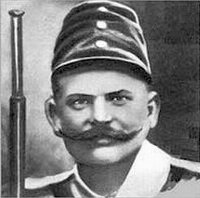
In December 1912 Hungarian tinsmith Béla Kiss told his neighbors that his wife had run off with another man. At the same time he began collecting large metal drums, telling the town constable that he planned to stockpile gasoline against the approaching war in Europe.
In November 1914 Kiss was drafted and left for the front, and in 1916 he was declared dead in combat. When soldiers visited the town that June in search of gasoline, the constable directed them to the dead man’s drums. On opening these they found that each contained not gasoline but the body of a nude woman, strangled and pickled in alcohol. A search of the house showed that Kiss had been luring women using newspaper advertisements in the name of Hoffmann, a “lonely widower seeking female companionship.”
In the surrounding countryside authorities found 17 more drums, each containing a corpse. Among them were Kiss’ wife and her lover.
It got worse. In 1919 Kiss was spotted near the Margaret Bridge in Budapest, and police discovered that the Béla Kiss who had been reported dead was in fact another man. In 1924 a deserter from the French Foreign Legion told of a legionnaire named Hoffmann who matched Kiss’ description and boasted of his skill with a garotte. But this Hoffmann himself deserted before police could apprehend him.
In 1932 New York detective Henry “Camera Eye” Oswald, who was renowned for remembering faces, insisted that he had seen Kiss emerge from the subway in Times Square, but crowds had prevented him from reaching him. Kiss was never apprehended, and his final fate is unknown.
